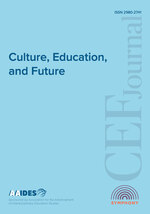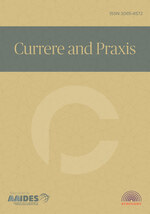Assessing teacher training quality and student learning outcomes in North Sindh secondary schools: A case study
Keywords:
Teacher training programs, secondary school teachers, student learning outcomes, case study, quality educationAbstract
North Sindh, Pakistan, is plagued by a number of socio-economic factors that confound the provision of quality education. Some of the most prominent issues include teacher shortages of qualified teachers and school facilities, among others. To offset such challenges, the Sindh Teachers Education and Development Authority (STEDA) and Provincial Institute of Teacher Education (PITE) have designed a series of Teacher Training Programs (TTPs). Their effect on Student Learning Outcomes (SLOs) remains to be adequately studied. The present study evaluates the effectiveness and quality of TTPs for Secondary School Teachers (SSTs) in North Sindh, highlighting important gaps such as the non-existence of assessment frameworks, contextual assessment, and feedback systems. The fact that investments have gone on unabated despite the absence of systematic evaluations has held back progress, resulting in flat outcomes. Using the case study approach, the research situates findings within the socio-cultural and institutional life of the region and offers meaningful information to policymakers and education leaders. It identifies the necessity for swift action to develop comprehensive appraisal and feedback systems to ensure continuous growth in teacher training and student achievement. Without such arrangements, long-term sustainability and effectiveness of TTPs are a matter of doubt, and education outcomes in North Sindh would likely continue to be unsatisfactory.
References
Adom, D., Mensah, J. A., & Dake, D. A. (2020). Test, measurement, and evaluation: Understanding and use of the concepts in education. International Journal of Evaluation and Research in Education, 9(1), 109–119.
Ahmad, S., & Ali, A. (2023). A critical review of secondary school teachers’ instructional planning & strategies in the light of national professional standards for teachers in Peshawar, Khyber Pakhtunkhwa Pakistan. Journal of Positive School Psychology, 7(1), 244–255.
Ahmed, S., & Ali, F. (2018). Evaluating the impact of teacher training programs on student learning outcomes: A case study of North Sindh. Journal of Education Research, 45(3), 321–335.
Ahmed, S., Khan, M. A., & Ali, N. (2019). Enhancing teaching skills through interactive training methods: A case study of teacher training in North Sindh. Journal of Education Research, 45(2), 211–226.
Ahmed, S., & Malik, N. (2020). Enhancing teacher education in Pakistan: A case study of North Sindh. Journal of Education and Practice, 11(3), 45–52.
Ali, F., & Siddiqui, A. (2021). Integrating technology in teacher training: A pathway to improving student learning outcomes in rural Sindh. International Journal of Educational Technology, 12(3), 315–330.
Ali, Z., Ahmad, N., Rehman, H. U., Ullah, N., & Zahra, T. (2023). Investigating teacher educators’ perceptions on technology integration in teacher preparation programs. Journal of Social Sciences Review, 3(2), 341–355.
Allan, G. (2020). Qualitative research. In Handbook for research students in the social sciences (pp. 177–189). Routledge.
Aslam, A., & Khoso, S. A. (2021). Utilization-focused evaluation in teacher training programs: Lessons from North Sindh. International Journal of Educational Development, 55, 102345.
Baloch, R., & Khoso, S. (2023). Feedback mechanisms in teacher training programs: Perspectives from North Sindh. Journal of Teacher Education, 25(4), 78–91.
Baloch, R. A., & Khoso, I. (2019). The impact of initial teacher training on the performance of public secondary schools in Khairpur, Sindh. Journal of Education and Social Sciences, 9(2), 120–128.
Chachar, Z. A., Ullah, N., Qureshi, A. J., Ujjan, S. B., & Chachar, A. A. (2023). Transformative influence of continuing professional development (CPD) on teaching approaches: A case study of secondary school teachers in Makran Division, Balochistan, Pakistan. Voyage Journal of Educational Studies, 3(3), 92–106.
Creswell, J. W. (2014). Research design: Qualitative, quantitative, and mixed methods approaches. Sage Publications.
Ghunio, A., & Shaikh, N. (2023). The influence of continuing professional development (CPD) on the teaching approaches of secondary school teachers in District Sukkur, Sindh, Pakistan. Pakistan Languages and Humanities Review, 7(2), 730–739.
Hennink, M., Hutter, I., & Bailey, A. (2020). Qualitative research methods. Sage.
Hussain, A., & Arain, G. A. (2021). A critical analysis of teachers’ training programmes in Pakistan. Journal of Education and Learning, 10(2), 253–263.
Hussain, M. (2018). Challenges of monitoring and evaluation in teacher training programs: A case study of North Sindh. Journal of Educational Policy and Planning Studies, 12(2), 87–98.
Hussain, M. A., & Naveed, M. (2023). Gaps in teaching learning theories in Pakistani teacher education programs: Bridging paradigm and reality. Voyage Journal of Educational Studies, 3(3), 1–17.
Jabeen, N., & Khalil, S. (2023). Impact of training on teacher’s performance in Karachi, Sindh, Pakistan. Pakistan Languages and Humanities Review, 7(2), 661–668.
Jackson, A. Y., & Mazzei, L. A. (2022). Thinking with theory in qualitative research. Routledge.
Jamali, A., & Memon, N. (2022). Teacher training and student achievement: Evidence from rural Sindh, Pakistan. Journal of Education and Practice, 13(6), 142–150.
Jamali, R., Abbas, S., & Khan, I. (2020). Community engagement in teacher training: A catalyst for educational reform in North Sindh. Journal of Community Development, 28(4), 451–466.
Jatoi, F., & Soomro, A. (2018). Continuous professional development in teacher training programs: A comparative analysis. Journal of Educational Development, 20(3), 56–68.
Jones, A. (2018). Triangulation in research: A critical review. Journal of Research Methods, 15(2), 205–220.
Kalim, U., & Bibi, S. (2024). Assessing teacher competencies in public schools of Pakistan: A pathway for improving the effectiveness of professional development programs for teachers. SAGE Open, 14(2), 21582440241236060.
Khalid, A., & Hussain, S. (2022). Enhancing teacher effectiveness through feedback mechanisms: Lessons from teacher training programs in rural Sindh. Journal of Educational Evaluation, 39(1), 87–102.
Khan, A., Malik, S., & Rahman, M. (2020). Tailoring teacher training programs to local needs: A case study of North Sindh. Journal of Teacher Education, 55(3), 312–327.
Khan, R., & Ali, M. (2021). Practical training components in teacher education: Perspectives from North Sindh. Teaching and Teacher Education, 29(4), 167–182.
Khushi, E. (2023). Teachers’ perspective on teacher education programs in Pakistan. Academy of Education and Social Sciences Review, 3(4), 410–419.
Kumar, A., & Shaikh, R. (2021). Enhancing data quality in monitoring and evaluation of teacher training programs: Strategies for North Sindh. International Journal of Educational Assessment, 9(2), 123–137.
Mahmood, R., & Malik, F. (2023). Building professional learning communities: A strategy for improving teacher effectiveness in North Sindh. International Journal of Educational Development, 45, 128–143.
Mahmood, S., & Shaikh, N. (2023). Community participation in teacher training programs: A case study of North Sindh, Pakistan. Journal of Educational Research and Studies, 11(3), 98–105.
Malik, N., & Aslam, S. (2019). Improving coordination mechanisms in monitoring and evaluation of teacher training programs: Insights from North Sindh. Journal of Education Management and Leadership, 27(3), 89–102.
Maxwell, J. A. (2013). Qualitative research design: An interactive approach. Sage Publications.
Memon, S., & Shaikh, A. (2020). Technology integration in teacher training: A case study of North Sindh. Journal of Educational Technology, 15(1), 34–47.
Mirza, N., Razak, R. A., & Salleh, U. K. M. (2023). Teacher educators’ perspectives on the incorporation of reading discipline courses in preservice teacher education programs in Pakistan. JuKu: Jurnal Kurikulum & Pengajaran Asia Pasifik, 11(2), 47–56.
Mohajan, D., & Mohajan, H. (2022). Exploration of coding in qualitative data analysis: Grounded theory perspective.
Nguyen, T. H., Do, H. T., & Nguyen, A. T. (2024, March). The natural science teacher training program meeting the demands of the new general education curriculum in Vietnam. Journal of Physics: Conference Series, 2727(1), 012031. IOP Publishing.
Prasla, A., & Ashiq, S. (2023). Exploring the perspective of B. Ed. 4 years students on teaching practicum: A comparative study of public and private teacher educational institutes of Pakistan. Hamdard Educus, 2(1), 1–16.
Qaisra, R., & Haider, S. Z. (2023). The influence of in-service teachers training programs on the professional development of school teachers. Pakistan Journal of Humanities and Social Sciences, 11(1), 507–516.
Qureshi, S., & Memon, S. (2020). Enhancing teacher training programs through community engagement: A case study of Sukkur, Sindh. Journal of Educational Strategies, 13(2), 67–76.
Rahman, A., & Abbas, N. (2018). Formative assessment in teacher training: A pathway to improving instructional practices in North Sindh. Journal of Curriculum Studies, 40(2), 189–204.
Rasool, U., Qian, J., & Aslam, M. Z. (2023). An investigation of foreign language writing anxiety and its reasons among pre-service EFL teachers in Pakistan. Frontiers in Psychology, 13, 947867.
Raza, M., & Shaikh, A. (2020). Utilization-focused evaluation: A framework for enhancing the impact of teacher training programs in North Sindh. International Journal of Educational Evaluation, 15(2), 167–180.
Saif, M., Ali, I. A., & Rashid, F. (2023). The challenges and opportunities of competency-based training in art & design: Pakistani teachers’ perspective. Journal of Arts & Social Sciences, 10(1), 143–147.
Shah, S. H., Quresh, J. A., & Kazi, A. (2023). A study to measure the effectiveness of teacher training progress on accelerated learning program (ALP) in Baluchistan: Using Kirkpatrick evaluation model. Journal of Positive School Psychology, 1449–1460.
Singh, A. K., Rind, I. A., & Sabur, Z. (2021). Continuous professional development of school teachers: Experiences of Bangladesh, India, and Pakistan. In Handbook of education systems in South Asia (pp. 1355–1380). Springer Singapore.
Smith, B., & Brown, C. (2019). Validating data through triangulation methods. Qualitative Research Journal, 7(3), 124–137.
Smith, B., & Sparkes, A. C. (2020). Qualitative research. In Handbook of sport psychology (pp. 999–1019). Wiley.
Smith, J. (2019). Integrating technology into monitoring and evaluation of teacher training programs: Opportunities and challenges. Educational Technology Research and Development, 67(5), 1293–1307.
Smith, J., & Wilson, L. (2018). Assessing the quality of teacher training programs: A review of literature. Educational Review, 38(4), 421–436.
Tahira, M., Hassan, A., Malik, A., & Yousuf, M. I. (2020). Teacher education in Pakistan: Issues and problems. Online Submission.
Teo, T., Unwin, S., Scherer, R., & Gardiner, V. (2021). Initial teacher training for twenty-first century skills in the Fourth Industrial Revolution (IR 4.0): A scoping review. Computers & Education, 170, 104223.
UNESCO. (2021). Global report on teachers: Addressing teacher shortages and transforming the profession. https://unesdoc.unesco.org/ark:/48223/pf0000388832.locale=en
Yin, R. K. (2009). Case study research: Design and methods (Vol. 5). Sage Publications.
Downloads
Published
How to Cite
Issue
Section
License
Copyright (c) 2025 Symphony

This work is licensed under a Creative Commons Attribution 4.0 International License.









